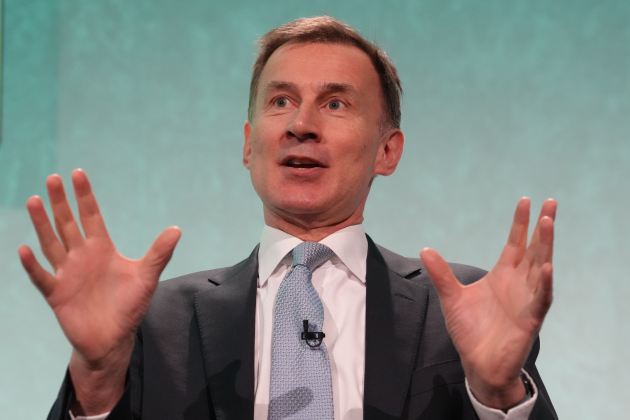Jeremy Hunt: UK economy has a ‘sprain’ – but it’s not as bad as a broken leg

Jeremy Hunt has denied the UK economy has a “broken leg” but admitted it is suffering from a “sprained ankle.”
The Chancellor had the medical analogy put to him by an audience member at a Resolution Foundation conference in Westminster – but insisted Britain should “not lose our self-belief.”
In a nod to his years as health secretary, Hunt was described as the UK’s “chief surgeon” and asked, “to what degree does our economy actually have a broken leg?”
But disagreeing with the metaphor, he claimed the UK was “one of the world’s best and most brilliant countries at beating ourselves up.”
Hunt said some commentators were “good at putting us under a magnifying glass, and identifying areas where – I’m not sure I describe it as a broken leg – but identifying areas where we can do better, and that is a very good thing for us that we do that.”
He added: “I think it’s really important not to lose our self-belief… sometimes we forget that other countries also have things that they need to improve.”
Citing the UK’s higher education system, its technology industry and its record on climate change, he insisted: “We’ve got a lot going for us – so if we’re going to go into dealing with the sprained ankle, rather than the broken leg, then let’s do so with respect to the positives.
“We’ve got so much going for us. I think we should have a little bit of optimism for the future because [we have] still got some of the most exciting prospects of any country in the world.”
The Chancellor also told the event, titled The Economy 2030 inquiry, which focused on ending stagnation, that the UK could be the “most prosperous” economy this century because of its “untapped potential.”
He said the industrial sectors – such as artificial intelligence (AI) and life sciences – which would grow the fastest – are ones “where we are doing really well.”
Hunt added: “If I was going to choose one country in the world that had the most untapped potential to become the most prosperous 21st century economy, it would be Britain.”
And he stressed that improving the UK’s productivity was the key challenge, but insisted last month’s Autumn Statement, which saw him announce tax breaks for business investment, was designed to improve this in the long term.
“The only way in the long run that you can raise living standards is by raising productivity,” he said.
November’s fiscal event, Jeremy Hunt said, introduced “the most competitive business investment reliefs in the world,” matched only among the OECD nations by Latvia and Estonia.
Along with the other 109 growth measures in the package, Hunt said it would increase business investment in the British economy by “£20bn a year.”
That would close “about half the gap” with competitors such as Germany, France and the US, where firms invest around two per cent of GDP more a year than in the UK.
